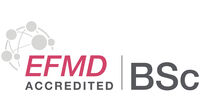BSc in Economics
Understanding the complications of domestic and international economies holds more value today than ever before. With a solid theoretical foundation in macroeconomics and microeconomics, students of Economics also gain practical experience through hands-on assignments.
Overview
 Credits
Credits
180 ECTS.
Language
Language of instruction is generally Icelandic. Selected modules are available in English, please see the online course catalogue for language of instruction for each course. For more information about courses in English, please contact the programme administrator:
Phone:+354 599-6358
E-mail: vd@ru.is
The RU International Office also provides information about study programmes for exchange students.
Highlights
- Diverse course options and interdisciplinary studies
- Focus is on problem-solving, diverse assessment methods, and group project work.
- Global outlook and strong ties with industry
- Teachers are accomplished academics in their field
Innovation and starting new ventures
Reykjavik University's Department of Business Administration has developed a unique interdisciplinary course which is a requirement for all first-year students at RU. In three weeks during spring semester, students must develop a unique product, from idea to prototype to market. Students work in teams made up from all four academic schools.
International accreditation
 The BSc programme in Business Administration has an accreditation from EFMD. The accreditation is granted by the European Foundation for Management Development, EFMD, a membership organisation of 750 business universities and other parties that work on developing and improving business education.
The BSc programme in Business Administration has an accreditation from EFMD. The accreditation is granted by the European Foundation for Management Development, EFMD, a membership organisation of 750 business universities and other parties that work on developing and improving business education.
Information for current students
Structure
Core courses
156 ECTS
Electives
12 ECTS
Final assignment
12 ECTS
Length of study
Three years.
Students generally take five courses (30 ECTS) per semester, four courses over a 12 week period followed by one course over a three week period.
Course catalogue
Information about courses can be found online in the RU Course Catalogue.
Structure
| First year - Autumn |
First year - Spring |
| Macroeconomics II | Microeconomics I |
| Applied Mathematics I | Applied Statistics I |
| Financial Accounting | Applied Mathematics II |
| Marketing Management | Management |
| Methodology (3 week module) | Entrepreneurship and Starting New Ventures (3 week module) |
| Second year - Autumn |
Second year- Spring |
| Macroeconomics II | Microeconomics II |
| Econometrics | Labour Economics |
| Corporate Finance | International Ecomomics |
| Design and Analysis of Annual Financial Statements | Public Finance and Public Choice |
| Valuation / Human Resource Management * | Portfolio Management / Managerial Accounting * |
| Third year - Autumn |
Third year - Spring |
| Quatitative Methods in Economics | Business Ethics |
| Applied Game Theory | Financial Markets / Operation Management * |
| History of Economic Theory and Economic Thought | Free elective |
| Applied Project in Economics (3 week module) | BSc Thesis |
| Free elective |
* Finance / Management
Admissions
Requirements
As a general rule, a matriculation examination or equivalent is a requirement. Other degrees are considered on an individual basis.
Mathematics
Applicants should preferably have certain basic mathematical skills. These basic skills consist in basic algebra (for example, power, roots, and logarithms), functions, curves in a coordinate system, and differentiation. It is preferable that students have completed at least mathematics 363 or equivalent.
Languages
Good skills in both Icelandic and English are required. The same admission requirements apply to the full-time programme and the part-time programme.
In order to apply for full-time programme, students need to speak Icelandic. Students can however take courses in the programme through the RU´s students' exchange programme.
What needs to accompany applications?
- An official (stamped) transcript of the matriculation examination must be submitted in print format to the RU reception. Scanned diplomas are not accepted.
- Letter of recommendation (a plus but not mandatory)
If students have completed university-level courses, they can apply for those previous studies to be evaluated for transfer of credit. Rules and form for evaluation of previous studies.
Contact us


